Competence: the Key to Safe and Efficient Offshore Operations
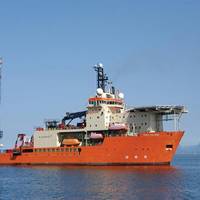
A competent workforce is a productive one, and operates with fewer risks, meaning shorter downtimes and fewer injuries. Effective competence schemes established by companies of all sizes ensure confidence in the offshore industry, and that all people appointed to safety-critical positions can carry out their jobs in an effective manner. To that end, the International Marine Contractors Association (IMCA) has established a highly effective competence assurance and assessment framework.
Frelinghuysen Directs Corps To Maintain Lower Miss. River
The Big River Coalition praised the efforts of the Chairman of the House Energy and Water Development Appropriations Subcommittee and the entire Louisiana Congressional delegation for their efforts to have the U.S. Corps of Engineers maintain the Lower Mississippi River to its project dimension. As the House of Representatives considers a Continuing Resolution to fund the Federal government through Sept. 30, U.S. Rep. Rodney Frelinghuysen of N.J., Chairman of the Energy and Water Development Appropriations Subcommittee, urged the Corps to direct funding to properly dredge and maintain the Lower Mississippi River. “I want to assure my colleagues that I have provided sufficient flexibility within the $2.361…
“Moratorium” is a Four Letter Word
While ten letters in all, “moratorium” might as well be the foulest four-letter word in the Gulf of Mexico oil patch right now. On May 27, the Obama Administration ordered a halt to drilling in water depths more than 500 feet, effectively cancelling 33 drilling projects and reversing a tide of industry optimism in the region. Bill Foret, president of Golden Meadow, La.-based Abdon Callais Offshore LLC, said the company could have placed 50 OSVs to work on April 19 — a day before BP’s Deepwater Horizon explosion, which killed 11 crew members and set off a gusher of crude 5,000 feet below the Gulf’s surface for more than 80 days. “The OSV market was showing signs of improving,” Foret said. Kurt Crosby, CEO of Crosby Tugs Inc., based in Golden Meadow, La., agreed.
Adams Interim President & CEO at OMSA
The Offshore Marine Service Association (OMSA) announced the appointment of James Adams as interim President and Chief Executive Officer. Adams’ appointment followed the resignation of Ken Wells, who has led OMSA since 2004. Wells left the organization in order to pursue other opportunities. Otto Candies, III, the chairman of OMSA’s board of directors stated, “We are sorry to see Ken go as he has served our organization and members energetically for six years. We are excited that Jim Adams has joined us in an interim capacity while we conduct a national search for a new CEO to lead OMSA.” Adams has held a variety of positions in government and public affairs and was most recently Vice President of Government Affairs for American Commercial Lines, Inc.
Judge Lifts Drilling Ban ... but Will it Last?
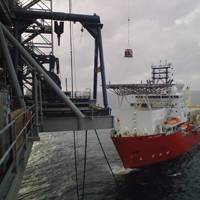
While offshore drillers, service and product suppliers received a bit of good news when U.S. District Judge Martin Feldman's ruled yesterday to remove the Obama Administration’s six-month moratorium on offshore drilling, questions regarding how quickly operations will return to normal are still up in the air, as according to the Wall Street Journal the administration vows to fight the decision. "Judge Feldman recognized the potential for the ban to cause significant economic harm to our country and the Gulf Coast…
Streamlined System Sought to Put Vessels to Work on Spill Clean-Up
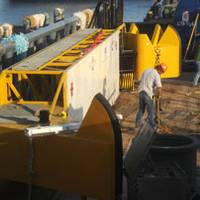
The Offshore Marine Service Association (OMSA) has proposed to BP and the U.S. Coast Guard that they create a smooth, efficient system to be sure vessel owners know what marine assets are needed to combat the Gulf oil spill, and to share with the Incident Command what vessels are available. OMSA, which represents the U.S. flag vessels that work in the offshore energy sector, has a number of member vessels that are currently involved in the cleanup effort, including skimming activities, working to control the leak at its source and setting out boom along the shore.
OMSA Testifies, Foreign Vessels Operating in U.S. Economic Zones
Offshore Marine Service Association (OMSA) President/CEO Ken Wells testified before the Subcommittee on Coast Guard and Maritime Transportation of the House Transportation and Infrastructure Committee on June 17, with regard to foreign vessels operating in the economic zone exclusive to American vessels. Testifying on the activities of foreign vessels that carry cargo and do construction work at offshore energy projects in the Gulf of Mexico, “our government enforcement agencies lack the tools to adequately track them or even hold them to compliance,” Wells said. OMSA members operate U.S. flag vessels and have made a commitment to comply with the laws of the United States on safety, environmental protection and security, and to pay American-level wages and American taxes.
Use U.S. Vessels in Gulf Spill Cleanup Says OMSA
The Offshore Marine Service Association (OMSA) released a statement saying that recent news stories have been erroneously reporting that foreign skimming vessels are not able to work on the BP oil spill clean up because of the Jones Act. These reports are incorrect, the association said. The Jones Act does not apply and therefore does not prevent foreign vessels from working on oil skimming operations in waters beyond the state’s three mile limit. In fact, a number of foreign vessels have been working at the scene for some time. For skimming activities within any state’s three mile limit, longstanding and established law says that any such work, including the skimming activity, must be performed by a U.S. vessel, if one is available. If a U.S.
OMSA, Drilling Moratorium Will Cause Hardship
The Offshore Marine Service Association (OMSA) reacted to the Obama Administration’s moratorium on offshore drilling, saying it is already causing irreparable economic harm for America’s maritime industry. “We are already dealing with both an ecological and economic disaster. This kind of sudden and ill-conceived government policy can only make it worse,” said OMSA Chairman Otto Candies, III. On May 27 the Administration ordered a halt to offshore drilling in water depths over 500 feet, canceling 33 drilling projects, an action that will have both immediate and long-term negative economic consequences for the businesses that are associated with drilling.
IRS Focuses on Foreign Vessels Evaiding Taxes
The Offshore Marine Service Association (OMSA) applauded the Internal Revenue Service’s (IRS) recently posted directive to field officers establishing an issue management team in the wake of an IRS analysis indicating that a significant number of foreign vessels permitted to work in the U.S. offshore oil and gas industry aren’t complying with U.S. filing requirements. In the directive, posted last week on the IRS web site, Keith M. Jones, the IRS industry director of Natural Resources and Construction (NRC), noted that, “In recent years, an increased number of foreign vessels have applied to enter and work in the OCS (Outer Continental Shelf). Our analysis indicates that a significant number of foreign vessels permitted to work in the OCS do not comply with U.S.
OMSA Applauds Move to Enforce Jones Act
The U.S. Customs and Border Protection (CBP) has issued a proposal, open for public comment through mid-August, that will take important steps to help enforce the Jones Act more effectively and protect American maritime jobs, according to the Offshore Marine Service Association (OMSA). Under the Jones Act, cargo can only be carried between two U.S. points on vessels that are owned and crewed by Americans and built in American shipyards. CBP, which administers the Jones Act as it applies to offshore energy operations, announced on July 17 that it plans to revoke or modify 20 rulings to restore the original intent of the Jones Act as it applies offshore.
Offshore: Which Way in ’09?
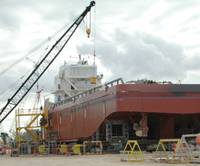
In mid July of 2008, oil prices shattered all-time records and hovered around $140 per barrel. Analysts had dire warnings of $200 per barrel oil. Gone are the days of “cheap” oil, cable newscasts screamed. Exactly a decade ago, oil prices slumped below $10 per barrel in December of 1998. Analysts then decried prices would never again rise to $40 per barrel, markets were saturated. Sound familiar? It seems commodity analysts’ predictions change as much as the nightly weatherman’s.
OMSA - Jones Act Compliance Manager
The national trade association that is the voice for the U.S. flag workboat industry has taken the unusual step of hiring an experienced investigator to collect evidence on foreign vessels that violate the U.S. law known as the Jones Act. The Offshore Marine Service Association (OMSA) has created a new position – Manager of Jones Act Compliance – to ensure compliance with the laws requiring that vessels involved in domestic transportation be owned by Americans, crewed by Americans and built in America. The newly hired individual will actively track the activities of foreign vessels working in the offshore oil and gas industry, determine whether those vessels are cheating on the Jones Act and work with enforcement agencies to punish violators. Joe Kavanaugh will serve in this position.
Expanded Offshore Drilling: Challenges Ahead
Each rise in the price of oil and its companion hike in gasoline prices moves us further and further into uncharted territory. What was once an academic argument over peak oil and how long our oil and gas would last is now front page news. There is now a very public debate raging over whether new areas of 's coastline should be opened to exploration. It seems likely that new areas will be leased. But from there the crystal ball gets a little murky. What areas might be opened and when? How long will it take to do the initial surveys of these undersea areas and what will we find? For the workboat industry and its customers, this period of uncertainty will bring its own questions.
"We Need to Talk About the Jones Act ..."
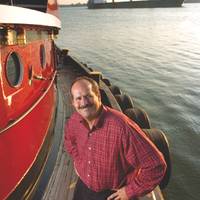
This is an open letter to the offshore oil and gas industry operating on the outer continental shelf. We need to talk about the Jones Act and the other cabotage laws that require you to use U.S.-flag vessels to transport cargo and people from one part of to another. You already know that, as the association that represents the owners and operators of flag workboats, we are willing to fight to protect the Jones Act. And we know that a lot of you don’t like the Jones Act and wish it didn’t exist.
Senate Hearing on Emission Reductions

Pictured is Senator Boxer. On February 14, the Senate Committee on Environment and Public Works conducted a legislative hearing on the Marine Vessel Emissions Reduction Act of 2007 (S. 1499). Committee Chair Barbara Boxer (D-CA) discussed the harmful air emissions from ships and the measures that would be required if her proposed legislation were enacted. Ranking Member James Inhofe (R-OK) pointed out that adoption of MARPOL Annex VI is preferable to enacting unilateral legislation.
Port Facility Hopes to Capitalize on Eastern Gulf Activity
The Venice Port Complex. The offshore oil and gas industry is no stranger to the southernmost point of Louisiana. For more than a half-century, offshore personnel drove to the community of Venice to board offshore supply vessels or helicopters to make the trip to their jobs atop drilling rigs in the Gulf of Mexico. Now, officials hope to redefine the area’s role in the offshore industry and capitalize on a planned boon in oil and gas drilling and production in the eastern Gulf. The effort consists of a re-branding of the facility and a healthy influx of investment capital for improved infrastructure. Welcome to the Venice Port Complex, much better sounding then the Louisiana Fruit Company site, its previous name relating to the facility’s development and proprietary company.
OMSA Applauds SAFE Port Act
The Offshore Marine Service Association (OMSA) applauds Congress for its passage of the Security and Accountability for Every (SAFE) Port Act. The legislation contains a key provision that will help reduce the risk of terrorist activity in America’s offshore oil and gas sector. Offshore drilling and production facilities have been vulnerable because there was not requirement for foreign vessels to report security information to the Coast guard when they go to work in offshore areas, according to OMSA. Currently, foreign vessels that call on U.S. ports are required to report information on crewmembers, vessel owners, cargo and the extent of their security plans.
Brown Water Industry Currently ‘In Transition’
The profitable process of moving products through North America’s vast inland waterways systems is increasingly dependent on vessel owners and operators finding and incorporating new technological means and methods to increase efficiencies. That was a core message at a recent meeting sponsored by the Ship Operations Cooperative Program (SOCP) and held in early March at the Litton-Avondale Shipyard. According to American Waterways Operators’ Ken Wells and others who spoke at the conference, market expansion projections are flat both in terms of materials moved and the overall customer base of shippers. Thus, the onus is squarely on owners and operators to ensure that their fleets are adequately outfitted to save precious time, money and fuel.
Technology, Image Top Inland Agenda
The North American inland marine market is neither technologically archaic nor as environmentally hazardous as many individuals outside of the marine market may think. These two issues dominated a recent meeting sponsored by the Ship Operations Cooperative Program (SOCP) held in early March at the Litton-Avondale Shipyard. The profitable process of moving products through North America's vast inland waterways systems is increasingly dependent on vessel owners and operators finding and incorporating new technological means and methods to increase efficiencies. Speakers from industry leading companies such as Kirby Barge Co.; Ingram Barge Co.…







